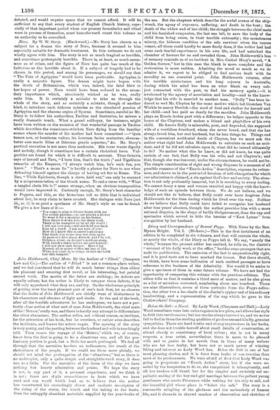Nero. By W. W. Story. (Blackwood.)—Mr. Story has chosen as
a subject for a drama the story of Nero, because it seemed to him especially suitable for dramatic treatment. In this estimate we do not wholly agree with him. The story is not so much tragical as horrible, and sometimes grotesquely horrible. There is, at least, as much mean- ness as of crime, and the figure of Nero has quite has much of the ludicrous as the horrible about it. If a subject of tragedy had to be chosen in this period, and among its personages, we should say that "The Fate of Agrippina" would have been preferable. Agrippina is really a majestic figure. The drama might have begun with the death of Britannicus, which was, indeed, the fatal blow to her hopes of power. Nero would have been reduced to the secon- dary importance which, atrociously wicked as he was, really snits him. It is certainly a mistake to take us through the whole of the story, and as certainly a mistake, though of another kind, to introduce such hideous episodes as the simulated passion of Agrippina and the obscene orgies of Spores. Sometimes, careful as Mr. Story is to follow his authorities, Tacitus and Suetonius, he misses a really dramatic touch. What a grand soliloquy, for instance, might have been written on the occasion of that wonderful passage in Tacitus which describes the conscience-stricken Nero flying from the familiar scenes where the murder of his mother had been committed :—" Quia tamen non, ut hominum vultus, ita locorum facies mntantur, obverse- bater ease maris Mils et littorum gravis aspectus," etc. Mr. Story's poetical execution is not more than moderate. His verse wants dignity and melody, though it sometimes has a certain rhetorical force. Vul- garities are found for which it is difficult to account. Thus Octavia says of herself and Nero, " I bore him, that's the truth ;" and Tigellinus remarks of the Emperor, "I always watch him, he's such fun, you know." That's a mean lie " is hardly a phrase for Nero to use when defending himself against the charge of having sot fire to Rome. The line, " While Epicharis, though a slave, held out," can only be scanned by a mispronunciation of the Greek name. To end a verse with, "What a tangled skein life is !" seems strange, when an obvious transposition would have improved it. Curiously enough, Mr. Story's best character is Popprea, and this, as the historians tell us little that is individual about her, he may claim to have created. Her dialogue with Nero (act sc. 3) is as good a specimen of Mr. Story's style as can be found. We give a few lines of it
e You come to play at leisure hours with me For selfish pastime,—as one plucks a flower To wear it for a moment on his breast, Then throw it down into the dusty road, There to be trampled on by all the world 1 will not love you,—will not hold you back E'en by a word. I am not sure of you! How do I know this moment's phantasy That binds you to me may not snap apart At passion's first sharp wrench, and I be left, Helpless, alone, on danger's perilous steep, With Death's abyss before me and behind: I will not dare such danger. Here I lay Moored, all at peace within my bay of life, When you came in to tempt, to lure me forth Into this tempest."






































 Previous page
Previous page